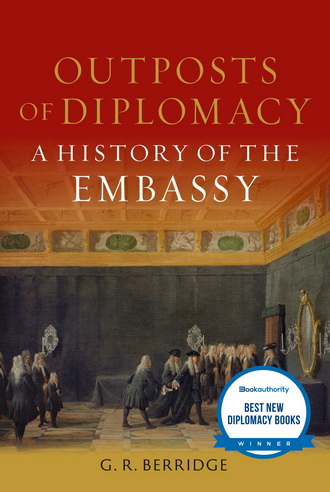Outposts of Diplomacy: A History of the Embassy
(Reaktion Books: London, 2024)

A profusely illustrated history of the embassy, from the diplomacy of antiquity to that of today. The book is 110,000 words long (excluding the index) and has 60 black and white illustrations. Published by Reaktion Books on 1 March 2024 in the UK and 1 May 2024 in the USA, where it is distributed by Chicago University Press. You can read more about the book on the Reaktion Books blog page here and in the ‘Honest truth’ column of the long-established Scottish weekly, The Sunday Post, under the title ‘Spies, smugglers and trade experts: the tangled history of the embassy’.
This is the contents list:
Preface
Introduction
1 Fifteenth-Century Beginnings
2 Expanding Duties
3 Household and Buildings
4 Pre-Telegraphic Communications
5 Nineteenth-Century Highpoint
6 Enter the Americas
7 The Middle East and Africa
8 Far Eastern Compounds
9 Backseat after the First World War
10 Stubborn Institution
Epilogue
Note on Sources
Acknowledgements
Photo Acknowledgements
Index
Reviews
G. R. Berridge’s ‘”Outposts of Diplomacy: A History of the Embassy” stands apart in diplomacy literature by offering a sweeping historical narrative of embassies from their ancient origins to their modern complexities. This illustrated history highlights how embassies evolved in staffing, architecture, and communication through pivotal periods such as the Renaissance and twentieth-century diplomacy. You’ll find valuable insights into how embassies adapted to geopolitical shifts, including their expanded roles in intelligence and diplomacy during turbulent times. This book serves those keen to deepen their understanding of the embassy’s institutional journey and its lasting impact on international relations.’ Book Authority’s 7 New Diplomacy Books defining 2025 Insights
‘Berridge intends to lead us through the thickets and secrets of the history of the embassy, showing us the impact this institution has had on the world’s history . . . Berridge makes it clear that in many cases attempts to influence other powers were not quite a pastoral project. There were assassinations and violations and rivalries; ambassadors could also test the boundaries of their privilege . . . There is a compelling history to be told of these machinations, and those mining for such detail can find much in Berridge’s account. ‘
Wall Street Journal, Edward Rothstein
‘We all know what embassies are: grand houses where pompous people stand under chandeliers drinking champagne to no obvious purpose. Why should we waste our money on these overpaid toffs when modern technology allows instant communication between world leaders? G.R. Berridge tackles the question in his history of the permanent diplomatic mission. It is a convoluted story, covering many continents and cultures, but Berridge has mastered the voluminous literature and the intricate detail. He is a fluent storyteller, though the story is overwhelming. ‘
History Today, Rodric Braithwaite, British Ambassador to the Soviet Union, 1988–91 and afterwards chair of the Joint Intelligence Committee
‘The history of the resident embassy since the Renaissance is the subject of this excellent and readable work. Berridge addresses transformations over the centuries resulting from religious conflicts, revolutions, world wars, conference diplomacy, and changing technologies . . . Berridge provides much anecdotal detail about individual diplomats, making this a lively, colorful, and enjoyable read. Highly recommended. ‘
Choice
‘Surprisingly captivating. . . . In these pages, Berridge gives readers not only a smoothly-paced and quietly eloquent account of that embassy evolution but also a marvelous gallery of the people who led those embassies . . . “Diplomacy,” Berridge wonderfully sums up, ”is the art of conducting business between states without resort to force, propaganda or law,” and Outposts of Diplomacy so entertainingly dramatizes this shop-talk world that readers will be wishing the book were three times its length. ‘
Open Letters Review – An Arts & Literature Review [USA], Steve Donoghue
‘Berridge provides a broad overview of diplomacy’s cornerstone – the resident embassy . . . this will appeal to political history buffs. ‘
Publishers Weekly, Anon.
In this enlivening book, historian GR Berridge describes how the embassy has evolved over time, defending its exceptional role … For the loyal Chatham House reader, Berridge’s book will prove irresistible and nostalgic in equal parts.
Mariana Vieira, Book Reviews Editor, International Affairs, Communications and Publishing
‘… the book contains many fascinating stories and richly detailed descriptions that will be of great value to scholars and practitioners of diplomacy. In addition, those who take an interest in international relations, public administration, corruption, intelligence and gender studies will also find the book worth reading. … Berridge’s comparison of the content of the diplomatic service lists of the British Foreign Office and the Austro-Hungarian equivalent offers wonderful insights into the organizational cultures of two different foreign services, as well as into the everyday lives of the diplomats who experienced the growing professionalization of these organizations in the late 1800s. Equally interesting are the accounts of how diplomatic staff have always tried to distance themselves from those involved in intelligence gathering. ‘
International Affairs, Birgitta Niklasson, University of Gothenburg, Department of Political Science
Foreign editions
Translation rights have been acquired by:
• Yedⅰtepe Printing Publishing Distribution Ltd, Istanbul, via Anatolialist Agency
• Shanghai Culture Publishing House via Gending Rights Agency (Simplified Chinese edition)


